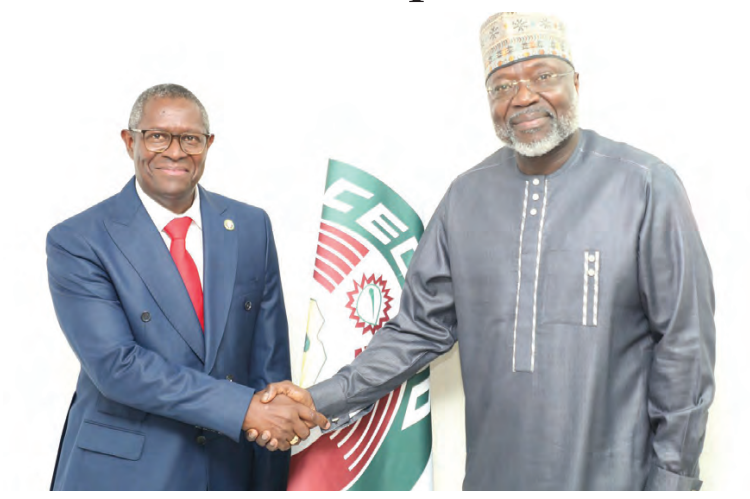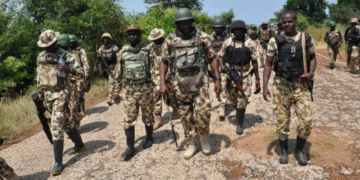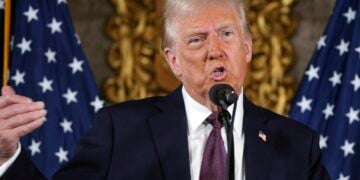Newly appointed president of the Community Court of Justice of the Economic Community of West African States (ECOWAS Court), Justice Ricardo Claudio Monteiro Gonçalves, is setting a new agenda for the court.
His efforts signal a commitment to enhancing collaboration with sister institutions, including the ECOWAS Commission and the ECOWAS Parliament, to promote greater integration and safeguard the rights of West African citizens.
As part of initiatives to enhance collaboration between community institutions, Justice Gonçalves, accompanied by the Vice-President , Honourable Justice Sengu Mohamed Koroma, paid a courtesy visit to Omar Alieu Tourey, President of the ECOWAS Commission, on Thursday, October 17, 2024.
The primary goal of this meeting was to strengthen the ties between the two institutions, fostering greater synergy for regional integration, according to a statement from the court’s communication division.
During the meeting, Tourey welcomed the initiative and congratulated the Court’s new management for their election. “I welcome you all home. It is a pleasure to meet you immediately after your election. We are delighted to congratulate you and to explore ways in which we can work more closely together as institutions of the community.”
The President of the Commission pointed out the vital importance of the Court of Justice for ECOWAS citizens, stating that “the Court represents the last resort for citizens dissatisfied with the solutions offered by national courts”. He also expressed his gratitude for the key role that the Court plays in upholding justice within the community.
The Honourable Justice Ricardo Gonçalves, in turn, reiterated the Court’s commitment to working closely with the Commission for the good of the community. “Since our election, we have undertaken a series of visits to community institutions to introduce the new leadership of the Court and to strengthen our collaboration. We are determined to work together to strengthen the Court and contribute to the development of our region.”
The Honourable Justice Sengu Mohamed Koroma concluded by stressing the importance of this collaboration for the next two years: “Through enhanced cooperation, we can continue to build a strong and united community, for the benefit of the citizens of the Member States,” he said.
This visit is part of a series of meetings initiated by the new management of the Court of Justice, aiming to promote close collaboration with sister ECOWAS institutions and to foster regional integration for the harmonious development of the community.
Honourable Justice Gonçalves from Cabo Verde was elected as the new President of the ECOWAS Court of Justice for a two-year term of office, following an election by the college of five judges of the Court. He succeeds Hon. Justice Edward Amoako Asante who led the Court for six years since assuming office on July 31, 2018.
In the same election, Hon. Justice Sengu Mohamed Koroma from Sierra Leone was elected as Vice-President, succeeding Hon Justice Gberi-bè Ouattara.
In his inaugural speech, Justice Goncalves t outlined his vision for the Court, which focused on two fundamental pillars: responsibility and dialogue. He emphasised the responsibility entrusted to the Court by the ECOWAS laws establishing the Court. He also stressed the need to uphold the institution’s mission as an independent, reliable, efficient, and accessible court.
He expressed his commitment to foster continuous dialogue with other institutions and agencies of ECOWAS, Member States, civil societies among others, while also ensuring financial prudence in the administration of the institution’s fund.
The court has grown in its moral and legal authority in recent times but it is constrained by the challenge of lack of direct enforcement mechanisms and relies heavily on voluntary compliance by member states.
In the past the Court had limited visibility and impact, primarily dealing with disputes between member states and the ECOWAS Commission but is has expanded its jurisdiction.
The court has deployed the ECOWAS legal architecture to addressing impunity in West Africa sub-region judging by its landmark judgments, notably the case of Dorothy Njamanze & 3 ors v the FRN.
However, according to Human right lawyer Femi Falana, the Court needs to expand its ambit to focus on socio-economic rights so that it won’t deny community citizens of the dividends of democracy including human rights.
Some experts have also suggested that the court should establish Legal Aid Fund to facilitate access to justice for victims of human rights abuses that cannot afford legal representation. These are some of the areas where the new President can introduce reforms.





